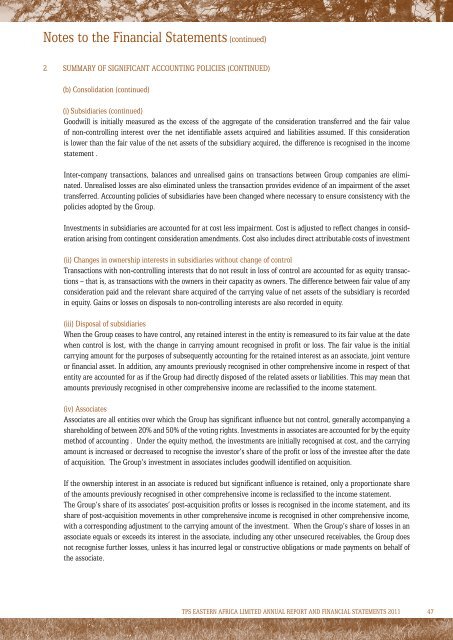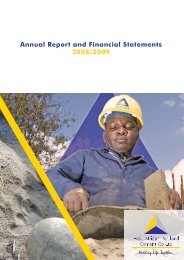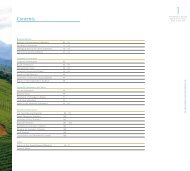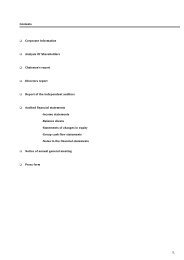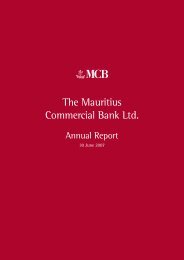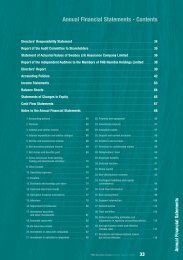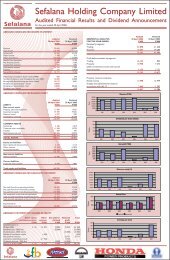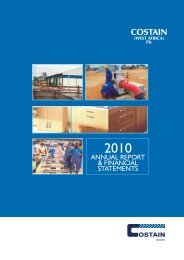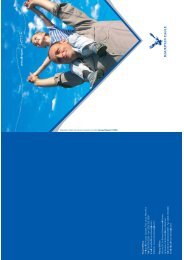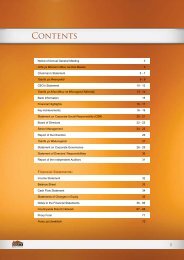2011 Annual Report and Accounts - Investing In Africa
2011 Annual Report and Accounts - Investing In Africa
2011 Annual Report and Accounts - Investing In Africa
You also want an ePaper? Increase the reach of your titles
YUMPU automatically turns print PDFs into web optimized ePapers that Google loves.
Notes to the Financial Statements (continued)<br />
2 Summary of significant accounting policies (continued)<br />
(b) Consolidation (continued)<br />
(i) Subsidiaries (continued)<br />
Goodwill is initially measured as the excess of the aggregate of the consideration transferred <strong>and</strong> the fair value<br />
of non-controlling interest over the net identifiable assets acquired <strong>and</strong> liabilities assumed. If this consideration<br />
is lower than the fair value of the net assets of the subsidiary acquired, the difference is recognised in the income<br />
statement .<br />
<strong>In</strong>ter-company transactions, balances <strong>and</strong> unrealised gains on transactions between Group companies are eliminated.<br />
Unrealised losses are also eliminated unless the transaction provides evidence of an impairment of the asset<br />
transferred. Accounting policies of subsidiaries have been changed where necessary to ensure consistency with the<br />
policies adopted by the Group.<br />
<strong>In</strong>vestments in subsidiaries are accounted for at cost less impairment. Cost is adjusted to reflect changes in consideration<br />
arising from contingent consideration amendments. Cost also includes direct attributable costs of investment<br />
(ii) Changes in ownership interests in subsidiaries without change of control<br />
Transactions with non-controlling interests that do not result in loss of control are accounted for as equity transactions<br />
– that is, as transactions with the owners in their capacity as owners. The difference between fair value of any<br />
consideration paid <strong>and</strong> the relevant share acquired of the carrying value of net assets of the subsidiary is recorded<br />
in equity. Gains or losses on disposals to non-controlling interests are also recorded in equity.<br />
(iii) Disposal of subsidiaries<br />
When the Group ceases to have control, any retained interest in the entity is remeasured to its fair value at the date<br />
when control is lost, with the change in carrying amount recognised in profit or loss. The fair value is the initial<br />
carrying amount for the purposes of subsequently accounting for the retained interest as an associate, joint venture<br />
or financial asset. <strong>In</strong> addition, any amounts previously recognised in other comprehensive income in respect of that<br />
entity are accounted for as if the Group had directly disposed of the related assets or liabilities. This may mean that<br />
amounts previously recognised in other comprehensive income are reclassified to the income statement.<br />
(iv) Associates<br />
Associates are all entities over which the Group has significant influence but not control, generally accompanying a<br />
shareholding of between 20% <strong>and</strong> 50% of the voting rights. <strong>In</strong>vestments in associates are accounted for by the equity<br />
method of accounting . Under the equity method, the investments are initially recognised at cost, <strong>and</strong> the carrying<br />
amount is increased or decreased to recognise the investor’s share of the profit or loss of the investee after the date<br />
of acquisition. The Group’s investment in associates includes goodwill identified on acquisition.<br />
If the ownership interest in an associate is reduced but significant influence is retained, only a proportionate share<br />
of the amounts previously recognised in other comprehensive income is reclassified to the income statement.<br />
The Group’s share of its associates’ post-acquisition profits or losses is recognised in the income statement, <strong>and</strong> its<br />
share of post-acquisition movements in other comprehensive income is recognised in other comprehensive income,<br />
with a corresponding adjustment to the carrying amount of the investment. When the Group’s share of losses in an<br />
associate equals or exceeds its interest in the associate, including any other unsecured receivables, the Group does<br />
not recognise further losses, unless it has incurred legal or constructive obligations or made payments on behalf of<br />
the associate.<br />
TPS EASTERN AFRICA LIMITED ANNUAL REPORT AND FINANCIAL STATEMENTS <strong>2011</strong> 47


